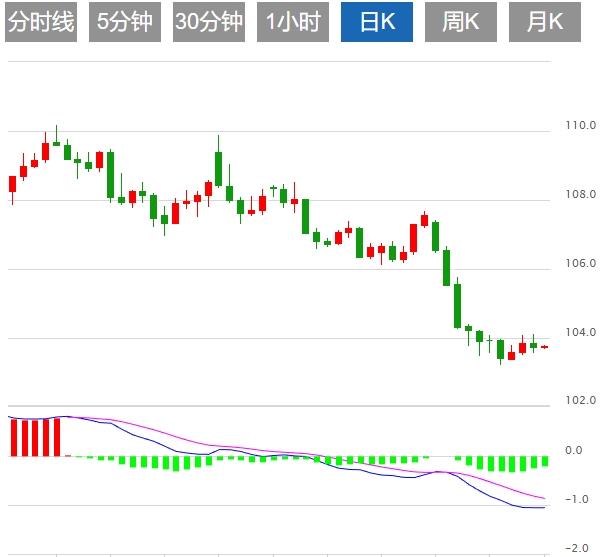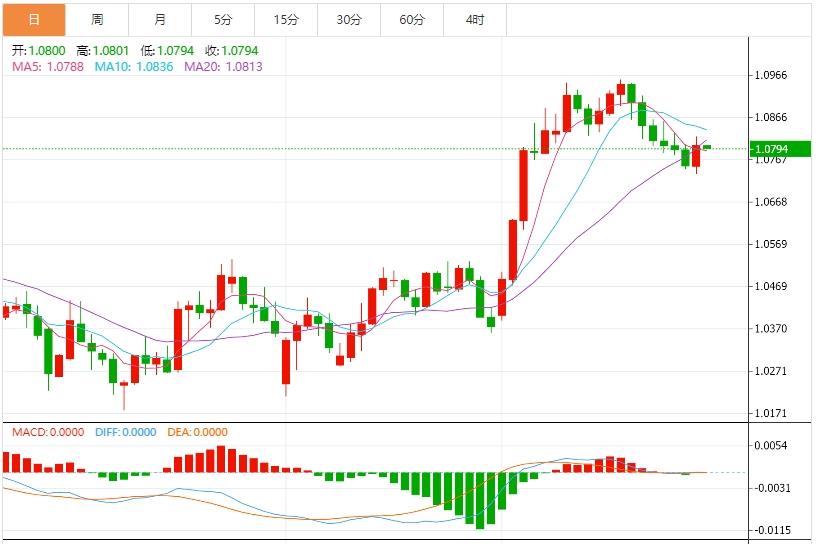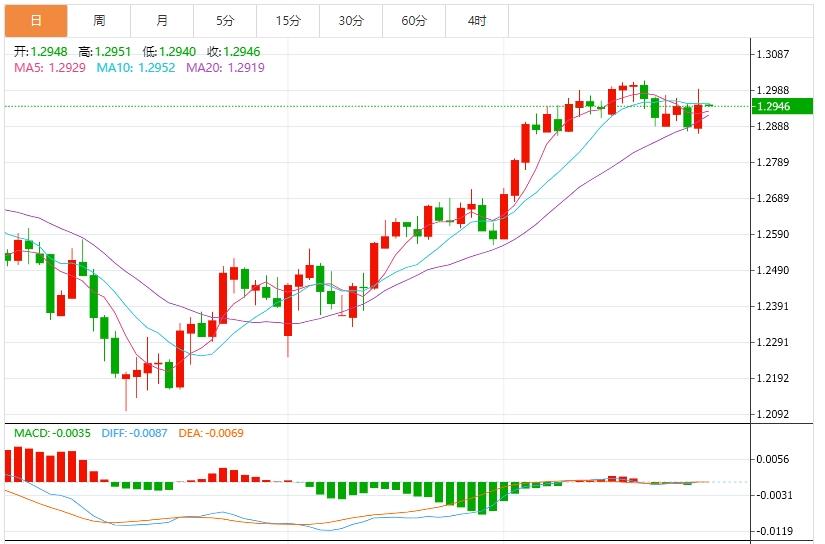Wonderful Introduction:
Only by setting off can you reach your ideals and destinations, only by working hard can you achieve brilliant success, and only by sowing can you gain. Only by pursuing can one taste a dignified person.
Hello everyone, today Avatrade Aihua Foreign Exchange will bring you "[Aihua Foreign Exchange Decision Analysis]: The US dollar index fluctuates above 104, and the market pays attention to US inflation data." Hope it will be helpful to you! The original content is as follows:
On the Asian session on Friday, the US dollar index hovered around 104.32. After the Federal Reserve decided to keep the index interest rate unchanged last week, investors are currently waiting for the U.S. personal consumption expenditure data released on Friday to judge the trajectory of further interest rate cuts.
Analysis of major currency trends
Dollar: As of press time, the US dollar index hovers around 104.28, and this week's key U.S. data release will be the core personal consumption expenditure (PCE) price index inflation on Friday. Technically, after successfully closing above 104.00 last week, a sharp rise to the 105.00 integer mark is still possible, with the 200-day simple moving average (SMA) converging at this point and strengthening the area as a strong resistance level of 104.96. Once the area is broken, a series of key levels, such as 105.53 and 105.89, may limit uptrend momentum. On the downside, the 104.00 integer mark is the first nearby support after a successful rebound on Tuesday. If this support level cannot be maintained, DXY may fall back to the range between 104.00 and 103.00 in March. Once the lower limit of 103.00 is broken, pay attention to 101.90 below.



1. Russian Vice Prime Minister: Armenia must choose between the EU and the Eurasian Economic Union
Russian Vice Prime Minister Alexei Overchuk said that Armenia will have to choose between the Eurasian Economic Union and the EU, and it is impossible to take two boats. On March 26, the Armenian parliament finally passed a bill on the country's intention to join the EU, but the EU itself did not recommend the country to join, and the opposition said the document was legally absurd. Overchuk told reporters: "I read the legal text adopted by Armenia. This is an internal matter of Armenia." He pointed out that the Eurasian Economic Union and the EU have "similar agendas." He said: "So of course, Armenia must clarify its direction and make a choice. Because it is impossible to step on two boats, it is absolutely obvious."
2. Sources: The United States has suspended membership fees to the WTO
Three sources said that as the Trump administration increases its efforts to cut government spending,The United States has suspended membership fees to the World Trade Organization. The Trump administration is withdrawing from institutions it believes are inconsistent with its "America First" economic policies, such as the World Health Organization, and cutting fees paid to other agencies. The WTO's annual budget for 2024 is 205 million Swiss francs (US$232.06 million), and the United States should have paid about 11% of it according to a fee system proportional to its share of global trade. Two sources directly informed the situation said a U.S. representative said at a budget meeting on March 4 that U.S. payments to the WTO 2024 and 2025 budgets will be suspended, pending review of international organization dues and will notify the WTO results on an unspecified date. A third trade source confirmed their claims and said the WTO is developing a Plan B in case of a long-term moratorium on funds.
3. Record monthly payment for American home buyers. The spring property market is turning around. Data from real estate brokerage firm Redfin shows that in late March, the monthly repayment of ordinary home buyers in the United States reached a record $2,807, up 5.3% from the same period last year. This increase is mainly attributed to rising sales prices and high mortgage rates. Currently, home sales prices have risen by 3% year-on-year, while the average mortgage interest rate has reached 6.67%, which is as much as twice the lowest level during the epidemic. Although mortgage rates have fallen from 7.04% since January, high costs are still curbing home sales. Data shows that sales of homes for sale fell by 4.6% year-on-year. However, with the arrival of spring, the property market seems to have seen some positive changes. Mortgage applications have peaked seasonally since early February, and home viewing activities have surpassed the same period last year. Meanwhile, searches for "homes for sale" on Google have soared sharply. On the supply side, the number of newly listed homes has increased by 7.5%, the biggest increase since 2025. Redfin's brokers said that despite high housing prices, some buyers have succeeded in negotiations to reach more favorable deals. The market generally believes that if the number of houses listed continues to grow and mortgage interest rates further decline, sales of houses for sale are expected to rebound. 4. Deutsche Bank: The pressure facing the Turkish lira has not been eased
avatradescn.commerz analyst Tata Gosh pointed out in a report that the pressure facing the Turkish lira has not been eased, and officials may be using strict controls and interventions to prevent the lira from falling further sharply. He said policymakers appear to be defending the "bottom line" of the dollar-Turkish lira exchange rate at around 38. He also said the scale of loss of foreign exchange reserves in such interventions is "neither ideal nor sustainable." Gosh said that unless the turmoil caused by Turkish President Erdogan's rival Ekrem ended, the Lira is likely to break through the current defense soon and depreciate significantly.
5. Analysts: Inflation pressure brought by Canadian wages andNot subsided
The inflationary pressure brought by Canadian wages has not subsided. The latest payroll data shows that the average weekly salary in January has almost no change, but after a year-on-year increase of 5.9% in December, it increased by 5.5% year-on-year. The average weekly working hours have almost no change on the month-on-month and year-on-year. An earlier workforce survey by Statistics Canada showed that average hourly wages rose 3.5% year-on-year in January, avatradescn.compared with a 4% increase in the previous month. Total working hours increased by 0.9% for the month, up 2.2% from last year. Consumer Price Index (CPI) inflation in February accelerated to 2.6% after six consecutive months at or below the Bank of Canada’s 2% target.
Institutional View
1. Deutsche Bank: Concerns about the Federal Reserve's reduction in currency swaps may put the dollar's status at risk.
Salavelos, head of foreign exchange research at Deutsche Bank, said that sources said this week that the ECB and regulatory officials have had informal discussions on the possibility of the Trump administration's possible push to push the Federal Reserve to exit the global investment and financing markets during a period of market pressure. There is no sign that the Trump administration wants the Fed to reduce the amount of currency swaps it has provided in past crises. But just as the United States began to "estrange" European allies, these discussions in Europe attracted attention. Even if the Fed fails to act, any concerns about the reliability of swap quotas can damage the dollar's status. If this concern is prevalent among the United States’ Western allies, it could create the most significant driving force for global de-dollarization since the establishment of the global financial architecture after World War II.
2. Bank of America: Trump's policy and EU reforms may help the euro strengthen in the next two years
Analysts of the Bank of America pointed out in a report that due to President Trump's policy plans and historic EU reforms, the euro is likely to show a stronger trend against the US dollar this year and next two years. Analysts believe that Trump's tariff policies and the avatradescn.combination of government spending cuts may lead to the US economy falling into stagflation, that is, high inflation and weak economic growth coexist. At the same time, Germany's fiscal expansion plan and the EU's defense spending plan will become an important turning point in the economic development of the eurozone.
3. FAC: US economy and Germany's fiscal uncertainty covers the US dollar's volatility is limited
Soviet Metallurgical's foreign exchange strategist Kit Jux said in a report that uncertainty in the US economic outlook and Germany's fiscal spending are hindering any major fluctuations in the US dollar. He said it is unclear whether Germany will put its new fiscal space into use and whether U.S. consumers will be adversely affected by Trump's policies. Since we cannot give a nearly 100% sure answer to either of these two questions, we are currently on the wait-and-see state. If there is evidence that U.S. trading partners have suffered more damage from Trump's tariff policies than the United States itself, the dollar may appreciate. Currently, market participants seem to be in"Wait and see mode".
The above content is all about "[Aihua Foreign Exchange Decision Analysis]: The US dollar index fluctuates above 104, the market pays attention to US inflation data". It is carefully avatradescn.compiled and edited by Aihua Avatrade Foreign Exchange editor. I hope it will be helpful to your trading! Thanks for the support!
Only the strong know how to fight; the weak are not qualified to fail, but are born to be conquered. Step up to learn the next article!















